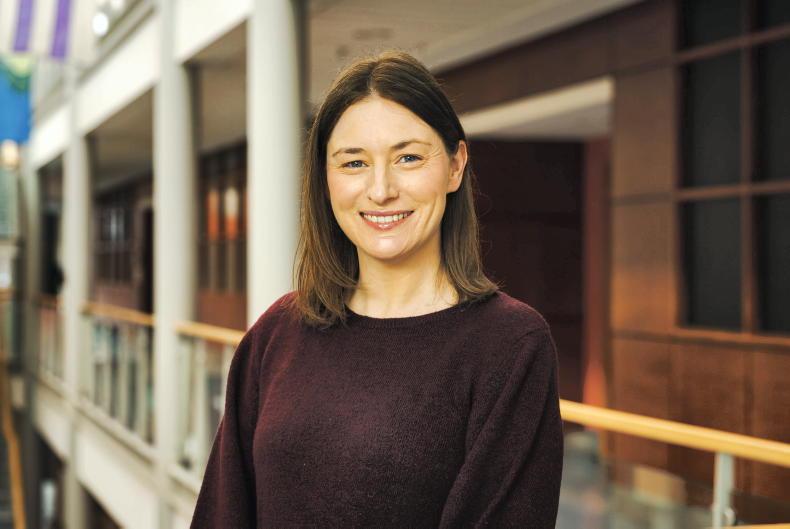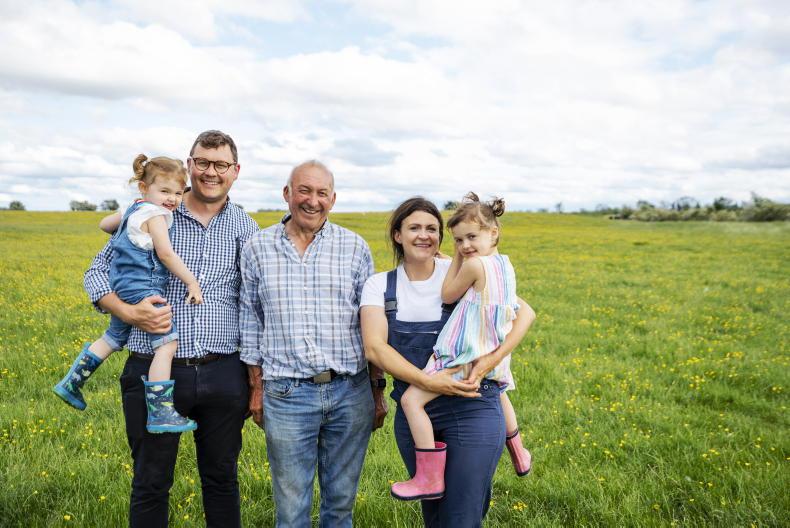Irish farm families’ awareness of mental health issues and the supports available is the focus of a new research project being led by an all-female team of academics at Dublin City University (DCU), in collaboration with Teagasc.
The ‘Mental Health Help-Seeking in Irish Farm Families’ study is currently conducting interviews with farmer’s spouses, children, parents and the wider family network who carry out a lot of farming work but don’t necessarily regard themselves as farmers.

Dr Siobhan O'Connor, Dublin City University School of Health and Human Performance and research lead.
Lead researcher Dr Siobhan O’Connor, from DCU’s School of Health and Human Performance, is herself of farming stock, coming from a mixed farm in Cork. She tells Irish Country Living that this current study will yield vital and valuable information on how the people who support farmers, can, in turn, mind their own mental health.
“I’m a farmer’s daughter from east Cork so I’ve always been interested in how farming is a whole family affair,” she says.
“We piloted work in farm families around mental health and it struck me that those family members were suffering the same issues as the farmers themselves.
“Farmers are an ageing population, many of whom have to work off-farm for financial reasons.
Symptoms of stress
“Parents, spouses and children provide labour to keep farms afloat, but they don’t necessarily identify themselves as farmers. Our previous research has highlighted the need for wider supports for farmers, especially around developing better ways to intentionally seek support.”
This new study aims to improve farm families’ mental health literacy and encourage them to seek help when experiencing mental health issues.
“Awareness of mental health is better in younger generations, but if someone isn’t able to recognise that they are struggling, or to identify the symptoms of stress in themselves, they are less likely to engage in services or reach out for help,” Dr O’Connor points out.
“One of the starkest findings in the previous research we conducted was that one in four farmers didn’t know where to go for help or how to get a number for suicide prevention services.
“Two-fifths of respondents believed it was admirable to cope with your own problems rather than seek help and if that is replicated in farm families, then we could have a problem.
“Self-stigmatisation, where a person has negative attitudes to their own poor mental health, is a real issue. Conversations are happening, but we need early interventions instead of waiting for problems that come down the line.
“Our survey is open to all families and we are up and running with our interviews, which are going very well. We’ve had a lot of women responding to the survey so we’re hoping to get a few more men on board.
“People won’t be asked about their own mental health in the interviews. We are asking participants what the farm means to them and to highlight areas they see as barriers to getting mental health support, what education they feel is needed, because they are the experts.
“We want their voice to shine through this research which is aimed at every type of farmer from dairy to organic, pigs to poultry across the island of Ireland.
“The survey will remain open until the end of May, at which point we’ll conclude our interviews with participants. We will use the information we gather to inform our approach to design a bespoke, mental health education programme for farm families.
“In our previous study, farmers told us not to call it a mental health programme and we were happy to be led by them so what we delivered was a Skills for Resilience programme.
“Farm families are on the periphery of a very intense occupation and there are not a lot of dedicated resources for them so it has been a challenge to reach them.
“One of the most impactful parts of the programme with the farmers was how it explained, step-by-step, how to get help for mental health difficulties and teaching people how to do this is the crucial first step.”
Mental health training
Wexford dairy farmer Patrick Hipwell, who is preparing to wrap his bales in green over the coming weeks – in a bid to highlight mental health awareness – welcomed the green light for the research to go ahead but said it needed to translate into real supports in rural Ireland.
“I’m an ambassador for Shine’s Green Ribbon campaign so I know how important it is to shed the stigma associated with mental health issues,” he says.
“People are beginning to look for help but we have to learn and be trained in how to react when someone does reach out. If someone comes to you with a toothache, you would send them to the dentist. It’s a different ballgame if someone comes to you saying they’re feeling low or struggling. People don’t know where the supports are to send them to.
“Research is one thing but there needs to be training for people in rural Ireland. People in the GAA, in Macra, the IFA, they’re the ones out talking to people on a constant basis and they’re the ones who need training in this area if we’re to make a difference.
“People used to be able to talk to the local priest in confession when they were feeling down or facing problems, but that is a service that’s no longer available in every parish and communities are feeling the loss of it.”

Dr John McNamara, Teagasc.
Dr John McNamara, health and safety specialist with Teagasc. who is working on the research says it was a key part in developing insightful supports for farm families.
“The family is a really important unit in Irish agriculture and it is wonderful that this research team, led by Dr O’Connor has secured the funding to carry out this work,” he says.
“Burnout, managing stress, and sleep patterns, are all things farm families, along with farmers, need to be aware of.
“The Total Health Model indicates safety, health and mental health are inter-related and need to be promoted holistically. All sorts of issues arise and all sorts of supports are needed so it is very useful to carry out this work.
“Farmer literacy around health and mental health is low, but is increasing slowly and gradually. We want to highlight the importance of health as farmers’ most important asset and we actively engage with them to prioritise sleep, diet, exercise and taking breaks from the farm as part of their overall health.
“My sense is this survey is being well received around the country and it is gaining traction with older farmers and their families, which is always challenging.
“We need to get the message out there that this is a very positive way for farm families to be heard and with our access to a lot of farming groups, we’re confident that there will be buy-in from the farming community.”

To fill in the survey, just scan this QR code with your phone.
Irish farm families’ awareness of mental health issues and the supports available is the focus of a new research project being led by an all-female team of academics at Dublin City University (DCU), in collaboration with Teagasc.
The ‘Mental Health Help-Seeking in Irish Farm Families’ study is currently conducting interviews with farmer’s spouses, children, parents and the wider family network who carry out a lot of farming work but don’t necessarily regard themselves as farmers.

Dr Siobhan O'Connor, Dublin City University School of Health and Human Performance and research lead.
Lead researcher Dr Siobhan O’Connor, from DCU’s School of Health and Human Performance, is herself of farming stock, coming from a mixed farm in Cork. She tells Irish Country Living that this current study will yield vital and valuable information on how the people who support farmers, can, in turn, mind their own mental health.
“I’m a farmer’s daughter from east Cork so I’ve always been interested in how farming is a whole family affair,” she says.
“We piloted work in farm families around mental health and it struck me that those family members were suffering the same issues as the farmers themselves.
“Farmers are an ageing population, many of whom have to work off-farm for financial reasons.
Symptoms of stress
“Parents, spouses and children provide labour to keep farms afloat, but they don’t necessarily identify themselves as farmers. Our previous research has highlighted the need for wider supports for farmers, especially around developing better ways to intentionally seek support.”
This new study aims to improve farm families’ mental health literacy and encourage them to seek help when experiencing mental health issues.
“Awareness of mental health is better in younger generations, but if someone isn’t able to recognise that they are struggling, or to identify the symptoms of stress in themselves, they are less likely to engage in services or reach out for help,” Dr O’Connor points out.
“One of the starkest findings in the previous research we conducted was that one in four farmers didn’t know where to go for help or how to get a number for suicide prevention services.
“Two-fifths of respondents believed it was admirable to cope with your own problems rather than seek help and if that is replicated in farm families, then we could have a problem.
“Self-stigmatisation, where a person has negative attitudes to their own poor mental health, is a real issue. Conversations are happening, but we need early interventions instead of waiting for problems that come down the line.
“Our survey is open to all families and we are up and running with our interviews, which are going very well. We’ve had a lot of women responding to the survey so we’re hoping to get a few more men on board.
“People won’t be asked about their own mental health in the interviews. We are asking participants what the farm means to them and to highlight areas they see as barriers to getting mental health support, what education they feel is needed, because they are the experts.
“We want their voice to shine through this research which is aimed at every type of farmer from dairy to organic, pigs to poultry across the island of Ireland.
“The survey will remain open until the end of May, at which point we’ll conclude our interviews with participants. We will use the information we gather to inform our approach to design a bespoke, mental health education programme for farm families.
“In our previous study, farmers told us not to call it a mental health programme and we were happy to be led by them so what we delivered was a Skills for Resilience programme.
“Farm families are on the periphery of a very intense occupation and there are not a lot of dedicated resources for them so it has been a challenge to reach them.
“One of the most impactful parts of the programme with the farmers was how it explained, step-by-step, how to get help for mental health difficulties and teaching people how to do this is the crucial first step.”
Mental health training
Wexford dairy farmer Patrick Hipwell, who is preparing to wrap his bales in green over the coming weeks – in a bid to highlight mental health awareness – welcomed the green light for the research to go ahead but said it needed to translate into real supports in rural Ireland.
“I’m an ambassador for Shine’s Green Ribbon campaign so I know how important it is to shed the stigma associated with mental health issues,” he says.
“People are beginning to look for help but we have to learn and be trained in how to react when someone does reach out. If someone comes to you with a toothache, you would send them to the dentist. It’s a different ballgame if someone comes to you saying they’re feeling low or struggling. People don’t know where the supports are to send them to.
“Research is one thing but there needs to be training for people in rural Ireland. People in the GAA, in Macra, the IFA, they’re the ones out talking to people on a constant basis and they’re the ones who need training in this area if we’re to make a difference.
“People used to be able to talk to the local priest in confession when they were feeling down or facing problems, but that is a service that’s no longer available in every parish and communities are feeling the loss of it.”

Dr John McNamara, Teagasc.
Dr John McNamara, health and safety specialist with Teagasc. who is working on the research says it was a key part in developing insightful supports for farm families.
“The family is a really important unit in Irish agriculture and it is wonderful that this research team, led by Dr O’Connor has secured the funding to carry out this work,” he says.
“Burnout, managing stress, and sleep patterns, are all things farm families, along with farmers, need to be aware of.
“The Total Health Model indicates safety, health and mental health are inter-related and need to be promoted holistically. All sorts of issues arise and all sorts of supports are needed so it is very useful to carry out this work.
“Farmer literacy around health and mental health is low, but is increasing slowly and gradually. We want to highlight the importance of health as farmers’ most important asset and we actively engage with them to prioritise sleep, diet, exercise and taking breaks from the farm as part of their overall health.
“My sense is this survey is being well received around the country and it is gaining traction with older farmers and their families, which is always challenging.
“We need to get the message out there that this is a very positive way for farm families to be heard and with our access to a lot of farming groups, we’re confident that there will be buy-in from the farming community.”

To fill in the survey, just scan this QR code with your phone.












SHARING OPTIONS